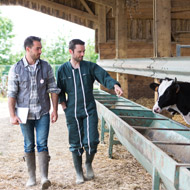Government to extend use of Approved Tuberculin Testers

A pilot project to trial the use of ATTs will be launched later this year.
The government has announced that that it intends to extend the use of Approved Tuberculin Testers (ATTs) to perform skin tests on cattle in England.
The decision follows a six-week consultation and will see the launch of a pilot project trialling the use of ATTs in private business later this year.
Welcoming the news, BVA senior vice president John Fishwick said: “BVA believes that there is a role for lay TB testers as part of a veterinary-led team, under veterinary direction, as long as all lay TB testers are appropriately trained, regulated and subject to standards of quality assurance that ensures an equivalent competence as a veterinary surgeon carrying out the same task.
“Approved Tuberculin Testers (ATTs) have the potential to fulfil a useful role within a vet-led team offering a fulfilling career option as well as expanding the veterinary practice offer. BVA supports the decision to develop an evidence-base through a pilot project before final decisions are made on veterinary supervision, test types, auditing and management of ATTs.
“We look forward to hearing more detail on how the pilot will incorporate different practice sizes and models and different geographies and cover the experience of the high-risk area, edge area and low-risk area where the testing regimes have diverged.”



 The Federation of Independent Veterinary Practices (FIVP) has announced a third season of its podcast, Practice Matters.
The Federation of Independent Veterinary Practices (FIVP) has announced a third season of its podcast, Practice Matters.